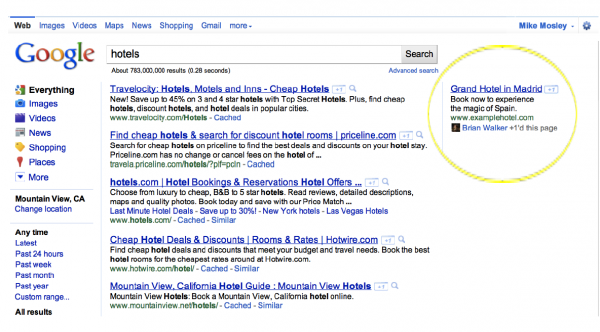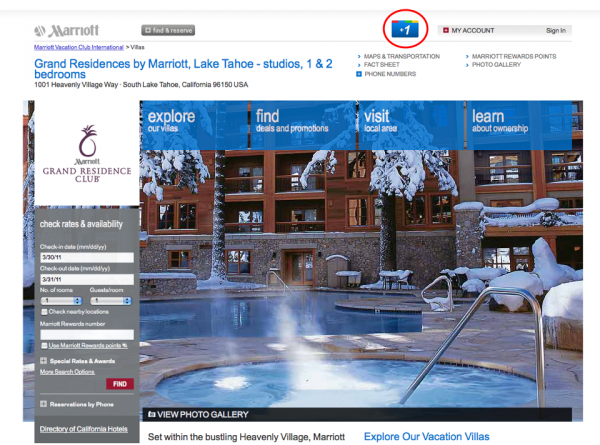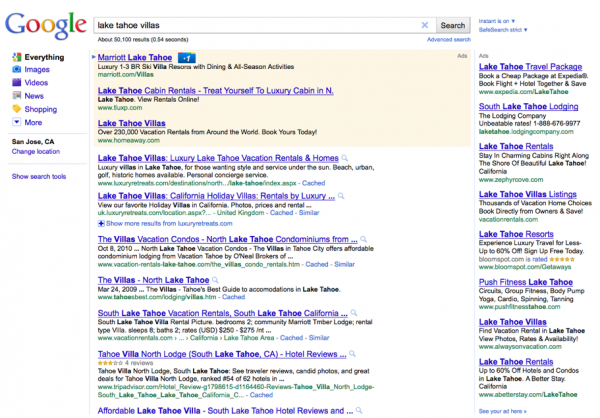Google’s +1 A Potential Boon To Paid Search Marketers
For an in-depth overview of Google’s new +1 extension of social search, see Danny Sullivan’s Meet +1: Google’s Answer To The Facebook Like Button. In addition, Matt McGee has written How To Get Google +1 Buttons For Your Website for publishers interested in adding the new button. Danny’s article briefly discusses how +1 will be […]
 For an in-depth overview of Google’s new +1 extension of social search, see Danny Sullivan’s Meet +1: Google’s Answer To The Facebook Like Button. In addition, Matt McGee has written How To Get Google +1 Buttons For Your Website for publishers interested in adding the new button.
For an in-depth overview of Google’s new +1 extension of social search, see Danny Sullivan’s Meet +1: Google’s Answer To The Facebook Like Button. In addition, Matt McGee has written How To Get Google +1 Buttons For Your Website for publishers interested in adding the new button.
Danny’s article briefly discusses how +1 will be used in conjunction with AdWords. I was able to speak to Google this afternoon about paid search and +1 and get a bit more detail.
+1 Ads Should See a CTR Lift
According to Christian Oestlien, Google’s Group Product Manager for Ads, +1 will appear on all Google search ads by default. However advertisers will be able to opt out by submitting this form.

Oestlien told me that early tests showed there was a lift for ads that featured +1 annotations. He anticipates that advertisers will be pleased with how it affects their response rates and CTRs. He added that early anecdotal feedback on the program from advertisers was positive. (We’ll have more on advertiser reaction later.)
As Danny pointed out in his article a user “plus-ing” (endorsing) an ad will not count as a click to the advertiser. (In my conversation with Google I took pains to avoid referring to this as “liking” an ad or search result.)
Organic +1’s Will Also Show Up in Ads
What’s also interesting is that users don’t need to specifically endorse ads for their pluses appear on ads. Google’s Oestlien said that there’s a common infrastructure for social search/+1 on both the organic and paid sides. As a result user pluses in organic SERPs or on publisher sites away from Google will impact their appearance in paid search ads.
Here’s a concrete example: say I’m looking for places to stay in Lake Tahoe California for a family ski vacation. I visit a Marriott hotel site as part of my research and decide I like the hotel (so to speak). I then decide to click the +1 button on that Marriott page. If Marriott later incorporates the same URL in its paid search ad for Tahoe vacations my +1 will appear on that ad together with my name and avatar.
Here’s my (not Google’s) mock up of what it would look like potentially:
As a fundamental matter, as a consumer-user, I must first have a Google Profile to participate in +1. If not, I’ll be asked to sign up and alerted that my pluses are public and so on.
To digress for a moment, there are three consumer experiences around +1:
- No Google account or not signed in
- Google account, signed in, but no Google Profile
- Google Profile holder
Those with Google Profiles can “plus” things; everyone else cannot. The next level down, Google account holders who are signed in will see all the +1’s and personalized “recommendations” even though they cannot add their own pluses without a Google Profile. It will look very much like Social Search does today. Finally, those not signed in or without a Google account will see aggregated +1 data but no personalized information: e.g., 10 users +1’d this (page or ad).
Like Facebook but Different
If all this sounds very much like Facebook Likes it’s only because it is. The big difference is that Google owns paid search advertising. And, as mentioned, these +1 annotations have the potential to provide a boost to AdWords campaigns.
Once that’s well understood we should see publishers trying to get users to “plus” their pages and coordinate that activity with paid search campaigns. In the future Google intends to cluster URLs so that the +1’d URL and the AdWords URL don’t have to be identical for +1’s to appear in the ad.
Publishers could also try and game the system. We may see efforts to solicit +1’s as we now do with Likes: “Like us on Facebook and receive an additional $2 off your purchase.” Accordingly: “+1 us and receive benefit X or Y.”
Google Profile Adoption Challenge
Because publishers and webmasters will quickly realize the potential AdWords and organic benefits of +1 they will adopt the button. The bigger challenge for Google is on the consumer side.
Facebook had a massive installed base of users before the “Like” button was rolled out. Google will need to create that base as it rolls +1 out by getting people to sign up for Google Profiles.
Pluses will be counted as one of the signals that Google eventually uses to determine organic rankings. It’s less clear whether pluses will impact ads quality and paid rankings.
Contributing authors are invited to create content for Search Engine Land and are chosen for their expertise and contribution to the search community. Our contributors work under the oversight of the editorial staff and contributions are checked for quality and relevance to our readers. The opinions they express are their own.
Related stories
New on Search Engine Land

